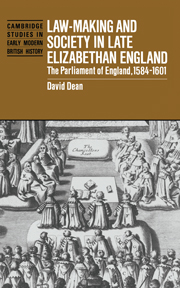Book contents
- Frontmatter
- Contents
- Acknowledgements
- Note to the reader
- List of abbreviations
- Introduction
- 1 Initiation and procedure
- 2 Supply and the general pardon
- 3 The crown and the state
- 4 Religion and the church
- 5 The commonweal
- 6 Law reform
- 7 Private legislation
- 8 Expiring laws continuance acts
- Epilogue: the Parliament of 1604
- Conclusion
- Index of acts
- Index of bills
- General index
3 - The crown and the state
Published online by Cambridge University Press: 14 September 2009
- Frontmatter
- Contents
- Acknowledgements
- Note to the reader
- List of abbreviations
- Introduction
- 1 Initiation and procedure
- 2 Supply and the general pardon
- 3 The crown and the state
- 4 Religion and the church
- 5 The commonweal
- 6 Law reform
- 7 Private legislation
- 8 Expiring laws continuance acts
- Epilogue: the Parliament of 1604
- Conclusion
- Index of acts
- Index of bills
- General index
Summary
THE SAFETY OF THE REALM
In June 1580 two heavily disguised men entered England with papal authority to convert the Queen's subjects to Roman Catholicism. The arrival of the Jesuits Edmund Campion and Robert Parsons coincided with renewed papal involvement in Ireland and a proclamation of January 1581 soon equated their activities with treason. The parliament which ended the following March passed an act which imposed a £20 fine on those refusing to attend church services and further proclamations against Jesuit priests followed. The security of the nation depended entirely, or so it seemed, on the frail life of their monarch. Those who assembled for parliament in November 1584 were acutely aware of the danger. The year 1583 had seen the uncovering of Francis Throckmorton's plot to assassinate the Queen. The fate of protestant Europe seemed to hang in the balance when, in July 1584, the protestant hero William the Silent was murdered. During election time many MPs and peers participated in a remarkable ritual. Joining together in a Bond of Association, the subscribers promised to pursue to the death anyone claiming the throne and benefiting from the Queen's murder. Since any beneficiary and their heirs were also to be barred from the throne, the Bond was the clearest possible statement that the Elizabethan elite considered Mary, Queen of Scots, the major threat to the security of the nation. Subscriptions were still being collected as parliament began on 23 November.
The 1584–5 parliament thus focused on the twin issues of the Queen's safety and the Jesuit threat.
- Type
- Chapter
- Information
- Law-Making and Society in Late Elizabethan EnglandThe Parliament of England, 1584–1601, pp. 63 - 97Publisher: Cambridge University PressPrint publication year: 1996

